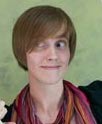In this three-part series, we talk with Anna Decker, organizer of the TEDx program at the Leonardo (and additional simulcast sites) Saturday, September 20.
Decker, 31, is a University of Utah graduate student with experience in event planning. She wanted to use the TED platform “for a local conversation  that was interdisciplinary and acceptable to the entire community… I plan on doing it annually and indefinitely.”
that was interdisciplinary and acceptable to the entire community… I plan on doing it annually and indefinitely.”
Part I:
UO: Your location at the Leonardo has been sold out for months. Why not have a bigger venue?
AD: Imagine the scope of managing a brand globally. You’ve got folks in Australia, Korea, Ann Arbor, Michigan, Salt Lake City, Utah, all using the same brand. We’ve all played the game Telephone at some time in our life. Things start to get diluted as you’re managing something on that scale.
What TED really wants to make sure that the brand is being maintained intact, that “Ideas worth spreading” stay “Ideas worth spreading.”
It’s really, really easy to fall into also saying “and this is my personal investment in it. I really want to sell you that.” It takes a really, really mature person and group of people to be able to curate and pull off that kind of event.
I have lots of experience, international experience, in planning events, in academia, health care, and government agencies. That was always on my radar. I have a really great team of people who have been able to stay pure to the Ideas Worth Spreading rather than self-promotion. But that’s hard to do.
From TED’s perspective of trying to maintain this brand integrity, this refreshing approach of ‘let’s just talk about ideas rather than trying to sell each other our businesses or our books or whatnot’ That’s been their approach.
UO: It’s a bit like the Rolling Stones saying they want to always do bar gigs and stay out of arenas?
AD: Absolutely.
UO: Can you tell me a bit about the selection process?
We had 80 to 90 applicants. We blinded them. I had one person remove any identifying information – the name of their organization, the name of the individual – from the big idea. We curated for ideas.
What is the big idea that’s being proposed here?
From there, again having that very diligent conversation of ‘it’s our job to put our biases aside here.’
We just judged on the quality of the idea:
Is it action-oriented?
How impactful is it?
How pertinent is it to our city?
From there we chose a first round of finalists. They all submitted a two-minute video, so we could see who they are as individuals and get some idea of the dynamics of their presentation style and their energy and those other things which are obviously important.
From there we chose our finalists. I think we’ll probably stick with that process for next year, too. It really brought us some gems that we didn’t even know about.

